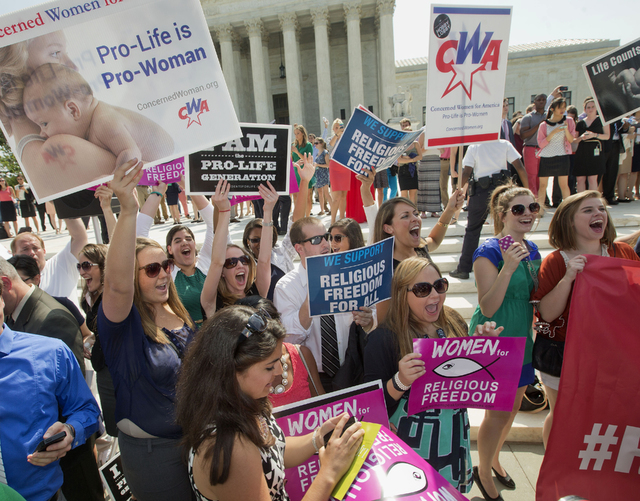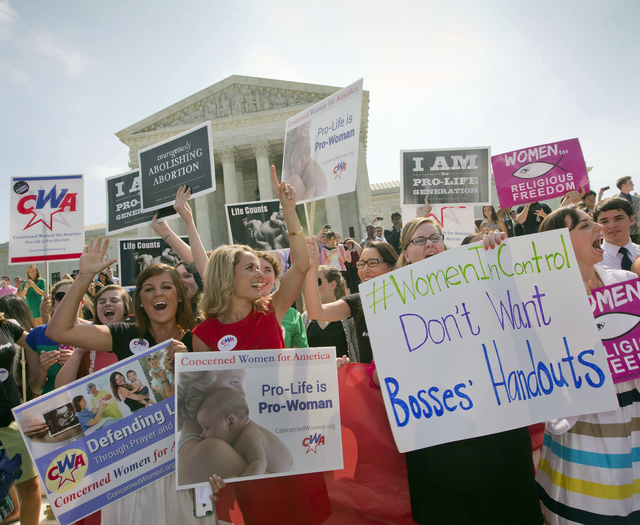Hate Hobby Lobby ruling? Then repeal the RFRA!
This week, Reps. Dina Titus and Steven Horsford joined with other House Democrats to support a bill aimed at blunting the effect of last week’s decision in Burwell v. Hobby Lobby.
The Protect Women’s Health Care from Corporate Interference Act of 2014 would specify that for-profit corporations cannot assert the religious beliefs of their owners when seeking to deny certain contraceptive health care coverage to female employees. (The owners of Hobby Lobby, citing their religiously based anti-abortion beliefs, objected to covering four of 20 FDA-approved forms of birth control, and the Supreme Court agreed that the Religious Freedom Restoration Act should be read to allow them to do so.)
While churches and religious nonprofits would be allowed to continue to avoid the contraceptive mandate promulgated under the Affordable Care Act, private, for-profit corporations would not, under the Democratic bill. A similar measure has been introduced in the Senate.
“The private beliefs of corporations and employers have no place in the health decisions of individual women,” Titus said in a statement. “The Supreme Court’s decision in the Hobby Lobby case opened the door for all closely-held corporations, which represent approximately 90 percent of businesses and employ 52 percent of Americans, to discriminate against their employees based on the religious beliefs of the owners. The [bill] will override this decision and ensure that the rights of the 99 percent of American women who will use contraception at some point in their lives cannot be taken away.”
Very well. But I’ll go you one better. Why not repeal the Religious Freedom Restoration Act in its entirety, or at least its most offensive feature, which requires the government to meet the highest legal standard when it ostensibly treads on “religious freedom”?
The Wall Street Journal, on its editorial page the day after the Hobby Lobby ruling, dared Democrats to do just that: “Yet the real liberal grievance isn’t with the Supreme Court, but with the RFRA itself. If Democrats are as upset as they claim, they ought to campaign this fall to repeal RFRA and be honest about how little they care about religious liberty.”
Instead, Democrats should be honest about how little they care about “religious liberty” being used as a shield to exempt people from following the law, and stand up for the perfectly acceptable balance the court set in place prior to the ill-considered RFRA.
The Journal is counting on Democrats to shrink in fear like, ahem, a vampire before a crucifix, at the thought of being called religiously intolerant. They know the RFRA passed unanimously in the House, had only three dissenting votes in the Senate and was signed into law by a triangulating Bill Clinton. And they’re hoping the spirit of pandering that prevailed in 1993 can be harnessed to silence Democrats now.
But Democrats and all defenders of the Constitution shouldn’t be silent.
Before RFRA, the courts stood up to protect religious rights based on the First and Fourteenth amendments, ruling in one case that a Seventh-Day Adventist fired for refusing to work on her church’s Sabbath was entitled to unemployment compensation, and that Amish children pulled out of school in violation of Wisconsin’s compulsory education laws could be justified on religious grounds.
But the court subsequently ruled two drug rehabilitation employees fired because they used peyote in a Native American religious ceremony didn’t qualify for unemployment compensation, because people must generally follow nondiscriminatory laws. “A holding to the contrary would create an extraordinary right to ignore generally applicable laws that are not supported by ‘compelling governmental interest’ on the basis of religious belief,” the court wrote.
The overreaction that followed was equally extraordinary. RFRA says the government needs a compelling interest to tread on religious liberty (itself not offensive to the Constitution). But it went far beyond that, saying any laws that did burden religious exercise must be tailored to be the least restrictive means of achieving those interests, the toughest legal standard there is.
Democrats may prefer simply to tinker around the edges of the Hobby Lobby ruling, and their fix is perfectly fine, as far as it goes. But to ensure similar problems don’t arise in the future, Democrats should strike at the root, and repeal the RFRA, or, at the very least, excise the “least restrictive means” language.
Anybody up for that?
Steve Sebelius is a Las Vegas Review-Journal political columnist who blogs at SlashPolitics.com. Follow him on Twitter (@SteveSebelius) or reach him at 702-387-5276 or ssebelius@reviewjournal.com.
























